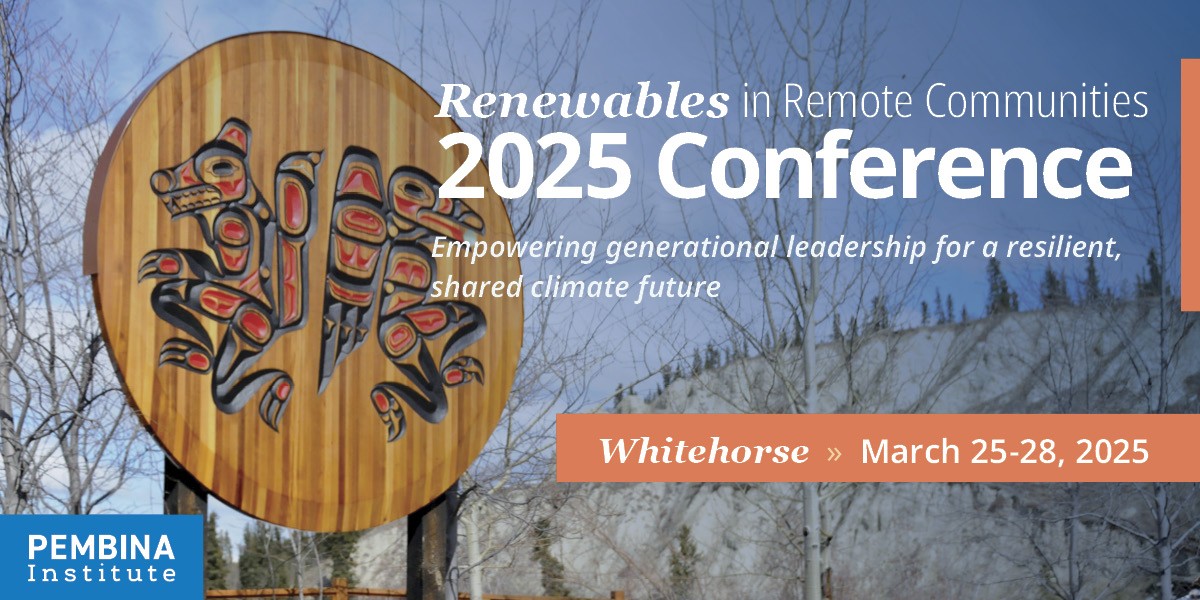About RiRC2025
The Pembina Institute is honoured to host the Renewables in Remote Communities Conference 2025 (RiRC2025) on the shared traditional territory of Kwanlin Dün First Nation and Ta’an Kwäch’än Council in Whitehorse, Yukon.
During RiRC2025 a wide range of Indigenous leaders, governments, industry, utilities and more will come together for dialogue on renewable energy development and clean energy opportunities in remote Indigenous communities across Canada. With the goal of accelerating and supporting an Indigenous-led transition to clean energy, the conference serves as a forum for exchange, networking and capacity-building.
About the theme
The theme of this year’s conference, “Empowering generational leadership for a resilient, shared climate future”, has been collaboratively determined alongside the conference’s Indigenous Advisory Committee. With the guidance of the committee, RiRC2025 is designed to pave a wider path for Indigenous leadership in the transition to clean energy in remote communities and bring attention to:
- Indigenous rights in the energy transition
- The essential leadership of youth, elders, and community leaders
- Policy and regulatory reform required for long-term and sustainable diesel reduction
- The tools and resources communities need to build and benefit from clean energy
- Recent advancements in decarbonizing remote clean energy systems
- Methods for establishing trusting, resilient, and reciprocal relationships
What to expect at RiRC2025
Over the course of the three-day conference, attendees will be invited to participate in a diverse and interactive program. Here’s what to expect at RIRC2025:
Panels, knowledge exchange, and networking:
Interested in learning more about the clean energy transition in remote communities? Attend the conference to learn from communities and experts who have experience with and perspectives on the clean energy transition taking place in remote communities across Canada.
Regional rooms:
Remote communities are often geographically isolated, making it challenging for them to form peer learning networks and create policy change – even within a singular jurisdiction. At RiRC2025, a set of “regional rooms” will be organized so that distances can be shortened, and communities, government representatives, utilities, and industry can focus on the policies and actions needed to reduce diesel consumption within their own region.
Each room discussion will be hosted by a trusted moderator and will be organized by region: British Columbia, Northwest Territories, Nunavut, and the Yukon.
Site visits:
Join us in visiting renewable energy installations in the Whitehorse area – speak with developers and project proponents to hear the on the ground lessons of implementing renewable energy projects.
Registration
Early bird registration is now closed. Regular registration is now open until March 2025. Early registration is recommended as tickets are in limited supply.
Host a booth at the RiRC2025 Exhibition
Submission Deadline: February 24, 2025
RiRC2025 will host an exhibit space to showcase organizational contributions to clean energy in remote communities. The exhibit, hosted on Tuesday March 25 to Thursday March 27, 2025, will invite community clean energy leaders, industry, and governments to purchase booth space and share project progress, network, showcase relevant technologies, and more with attendees: Exhibit Guidelines
Agenda and conference proceedings
Loading...
Advisory committee
We are honoured to work with an Indigenous Advisory Committee to design and deliver RiRC2025. This committee brings invaluable insight and knowledge on clean energy development in Indigenous communities and has supported RiRC2025’s planning, conceptualization, and more.
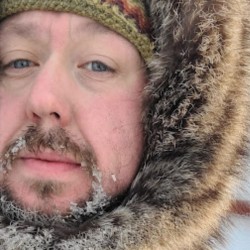
Blaine Chislett
Manager of Energy and Sustainability, Sakku Investments Corporation
About Blaine
My name is Blaine Chislett, and I proudly hail from the Inuk community of Rankin Inlet in Nunavut. Over the past five years, I have been passionately dedicated to advancing renewable energy initiatives in remote communities. Today, I am excited to embark on a new chapter in my journey, as I step into the role of Manager of Energy & Sustainability at Sakku Investments Corporation, where I can direct my energies towards the renewable push, fortified by the backing and support of Sakku Investments Corporation.
My journey has seen several milestones that have shaped my expertise and commitment to renewable energy. I am a proud alumnus of the 20/20 Catalyst Program, which provided me with valuable insights into sustainable energy solutions.
In 2022, I had the privilege of representing indigenous voices at the COP 27 conference in Egypt as one of the three indigenous trailblazers in renewable energy. This experience broadened my horizons and deepened my resolve to drive positive change.
Furthermore, I am honored to have been chosen as a recipient of the first cohort of the Indigenous Off Diesel Initiative (IODI) program by the federal government of Canada. This initiative is pivotal in our efforts to reduce our dependence on fossil fuels and embrace greener alternatives.
At present, I am actively engaged in my role with Sakku Investments corporation and with our JV company Kivalliq Alternative Energy, where I am spearheading multiple groundbreaking projects.
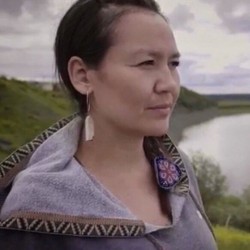
Erika Tizya-Tramm
Manager of Community Partnerships, Northern Energy Innovation
About Erika
Erika Tizya-Tramm serves as the Manager of Community Partnerships with Northern Energy Innovation at Yukon University. As a member of the Vuntut Gwitchin First Nation, she is deeply committed to Indigenous Nation-building by advancing environmental stewardship and sustainability priorities. With over two decades of experience in land and resource management, Erika is uniquely positioned at the intersection of traditional Indigenous stewardship values and modern sustainability practices. She has successfully led Indigenous-driven initiatives in land use planning and management, policy and legislative development, and renewable energy projects such as solar and wind, aimed at reducing carbon footprints and fostering energy sovereignty. Her work emphasizes the integration of traditional knowledge with innovative approaches to create sustainable futures for Indigenous communities. Outside of work, Erika enjoys spending time laughing with family and friends.
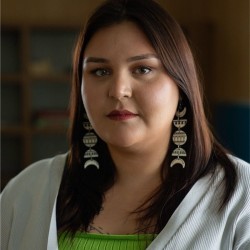
Grace Nakimayak
Clean Energy Coordinator, Paulatuk Energy Working Group
About Grace
Grace Nakimayak is the clean energy coordinator for the Paulatuk Energy Working Group. She started in this role in October 2021 to carry out the clean energy ambitions of the working group, which includes community leaders from the Hamlet of Paulatuk, Hunters and Trappers Committee, Elders Committee and Paulatuk Community Corporation. Grace is a proud Inuvialuit woman, born in Yellowknife and grew up living all over the country. Grace is passionate about helping her community reduce their cost of living as well as improve the quality of life, developing economic opportunities and implementing initiatives to reduce fossil fuel consumption. In her free time, she loves getting out on the land, hunting, camping and fishing.
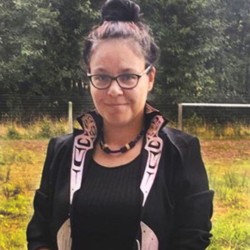
Kwaa Tsaaps
Energy Planner, Council of the Haida Nation
About Kwaa Tsaaps
Kwaa Tsaaps hinuu dii kyaan, Patrika McEvoy is her English name. She is of the Yahgu’laanas clan of Haida Gwaii. Kwaa Tsaaps had served Old Massett Village Council as an elected member of Council for five years. Passionate to serve her community with Emergency Response, Climate Adaptation, and helped create the Xaadgee Tla Hlangulee Ayaagaa Trades Training program for Old Massett to foster their housing needs in the community. Kwaa Tsaaps was a Board of Director for Tll Yaahda Energy, which is a partnership uniting OMVC, Skidegate Band Council, and the Council of the Haida Nation to pursue renewable energy initiatives for Haida Gwaii. As well as serving other Boards including being on the Public and Technical Advisory Committee for the Solid Waste Management Plan with North Coast Regional District. She is passionate about language Revitalization and is currently in Xaad Kil (Haida) and Nisga’a classes. Her values revolve around acknowledging: Gin Waadluuwaan Guud Ahl Kwagiidang, everything is connected to each other.
A mother of three children, she recently graduated from the Public Administration and Governance Program with McGill University which she successfully managed during Covid, which included Project Management, Lean Operations, Strategic Planning, and Implementation. Kwaa Tsaaps is always committed to her professional development and education and took training in Leading Teams and Negotiation Skills Certification with the Banff Center Indigenous Leadership programs. Kwaa Tsaaps also served with Coastal First Nations, Great Bear Initiative as the Community Technical Coordinator for the Early Earthquake Extension project for two years. In Xaad kil, the Haida language this can be identified as: Tl’agee xildang hlGangulaas Earthquake Work. She traveled across all their nations, and installed Earthquake Early Warning Sensors supported by Natural Resources Canada. Kwaa Tsaaps is currently working for the Council of the Haida Nation, as their Energy Planner for Haida Gwaii.
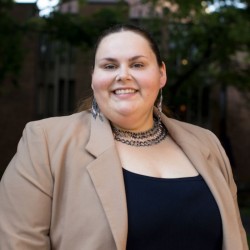
Raylene Mitchell
Council Member, SevenGen 2023-2024
About Raylene
Raylene Mitchell is a council member at SevenGen for the 2023-24 term. She is currently a PhD student at the University of Toronto's Mechanical and Industrial Engineering department in the field of energy storage and unique solutions. She is passionate about technological solutions for northern regions in Canada. As an Inuk engineer from Labrador, Raylene is also committed to interdisciplinary innovation and education and believes being an engineer and Indigenous do not have to be mutually exclusive identities. Her commitment to addressing the unique challenges of northern communities is at the forefront of her research goals, and aims for a career centered in innovative engineering solutions for northern and remote environments.
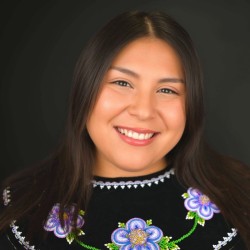
Serena Mendizabal
Just Transition Manager, Sacred Earth Solar
About Serena
Serena Mendizabal (she/her) is a Cayuga Wolf Clan-Panamanian woman from the Six Nations of the Grand River Territory. Serena is a community-based researcher, grassroots organizer, and environmental advocate. Serena began her journey in climate justice and clean energy when she was 18 finding gaps in community consent and further explored what climate justice and a just transition can look like in a community of over 28,000 members. From then on, Serena has dedicated her life to Indigenous self-determination, climate justice, environmental health impacts, and clean energy transitions through studies, work, and extracurriculars. Serena is passionate about self-determined community development, action, and futures led by sovereign, healthy nations. Serena is the Just Transition Manager at Sacred Earth Solar, Co-Chair at SevenGen National Indigenous Youth Energy Council, Climate Action Strategy Co-Lead at Protect the Tract, and Course Collaborator for Connecting for Climate Change Action, as well as Board of Director at Student Energy and an Advisory Council member for Indigenous Clean Energy.
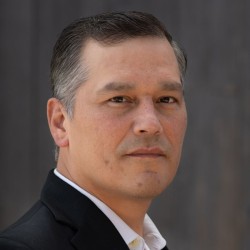
Trent Moraes
Deputy Chief Councillor, Skidegate Band Council
About Trent
Nangkilslas, Trent Moraes, is a Haida from Skidegate, Haida Gwaii. He is an elected member of the Skidegate Band Council and is the current Deputy Chief Councillor. He spent a decade in administration as the director of Housing, Lands & Energy for the Skidegate Band Council. Trent helped create and maintain an energy portfolio in Skidegate and for Haida Gwaii.
He is also a member of several groups, including the First Nations Home Energy Save Advisory, Indigenous Clean Energy Opportunity Electricity Table Advisory Group, First Nations Remote Community Energy Strategy Working Group, and current chair of Aboriginal Capital Committee, Indigenous Climate Adaptation Working Group, ;and Indigenous Coastal Climate Coalition.
Trent helped the Skidegate Band Council study the needs of the community and islands, educated the public on the emerging technologies and energy efficiency strategies available, and invested in solar hot water and solar photovoltaics for community and residential buildings. Skidegate has engaged BC Hydro on many levels and created Indigenous pilot programs for B.C. The Skidegate community goal is to become one of the greenest communities in B.C.
Travel and accommodations
Hotel and flight codes will be provided in your registration confirmation email. RiRC2025 hotels include Best Western Gold Rush Inn, Edgewater Hotel, Raven Inn, Sternwheeler Hotel, Yukon Inn, and Skky Hotel. We would like to thank Air North - Yukon’s Airline for their generous travel support for RiRC2025 attendees.
Sponsors

RiRC2025 is made possible through the generous support of an array of organizations, individuals, and institutions. By supporting this 4th biennial conference, your organization will play an important role in advancing the critical discussions, research, and convening needed to strengthen the Indigenous-led clean energy transition in remote communities. Explore our sponsorship package and become a vital player in this important event.
If you have additional questions, we encourage you to get in contact with Samantha Ward, Associate Director Strategic Partnerships.
Indigenous travel support
In the spirit of gathering, access, and inclusion, the Pembina Institute is pleased to offer financial support to Indigenous attendees of the 2025 Renewables in Remote Communities Conference.
Travel support is subject to available funding. Please contact Fibha Nazim (fibhan@pembina.org) for more information.
Platinum+ Sponsors

Gold Sponsors

Bronze Sponsors
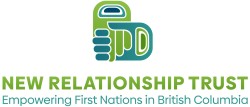


Travel Sponsors

Contact us
If you have any questions related to RiRC2025, please direct them to Fibha Nazim (fibhan@pembina.org).
Stay up to date on conference announcements, including registration, agenda, and speakers by signing up for our conference newsletter:
